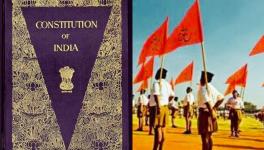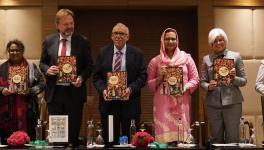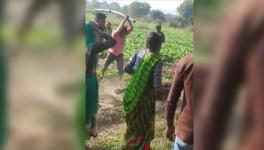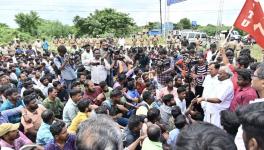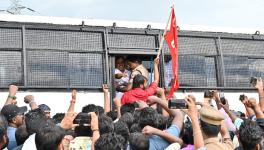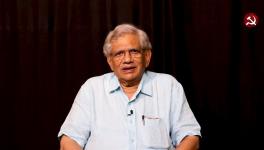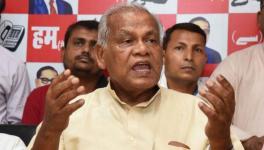TN: Anatomy of Caste Discrimination in a Village Where Dalits Defied Diktats

Kannamani, a dalit woman claims that she or none of her ancestors or descendants have entered into the Raja Kaliyamman temple (Photo - Vignesh A, 101Reporters).
Tiruppur, Tamil Nadu: At the dead end of a street that sees no vehicle movement stands the modest house of A Muruganantham (51), an Arunthathiyar from Rajavur village in Tiruppur district of Tamil Nadu. This New Year’s dawn, Muruganantham was treated to an awful sight — a cat’s carcass thrown in front of his house with its neck slit. He figured out instantly that it was the fallout of a complaint lodged by him, besides his participation in an anti-caste temple procession.
“It was done to threaten my life and dissuade the Dalits in the name of black magic. Unfortunately, even a few members of my caste connive with the perpetrators,” he sighs. His house is now under round-the-clock protection, but it could be withdrawn at the police’s discretion any time.
Rajavur, officially named Kondavanaickenpatti, falls under Maivadi panchayat. OBC community Kambala Naicker is the majority caste here, while Scheduled Caste Arunthathiyar is the minority. In all, Rajavur has a total population of 1,500. Kongu Vellala Gounders, a politically and economically powerful OBC community in the state’s western districts, also make up a considerable population.
Naickers of Rajavur and the neighbouring Periyakottai are mainly agrarian. Across the state, the community is known for black magic practice. Besides their economic and social supremacy, the fear of alleged practices such as placing voodoo dolls under the surface of Naicker streets to harm those who violate casteist diktats prevented the Dalits from voicing against the discrimination that Naickers perpetrated.
Generally, the Dalits are allowed to live only in designated slums (now colonies) outside villages. People of Pudhu Colony of Rajavur do not have permission to wear footwear in the neighbourhood where Naickers live and on the road that leads to the Raja Kaliyamman Temple. Though the temple is under the Hindu Religious and Charitable Endowments Department since 2022, it hereditarily belongs to the Naickers of Rajavur and Periyakottai. Not to say, the Dalits cannot enter the temple.
There is no documented information about the exact year of its construction, but at least three generations of Dalits and non-Dalits claim that they know of this temple since birth, which indirectly indicates that caste discrimination has been going on for over three generations.
“When I was a teenager, I unknowingly went inside the Naicker street wearing footwear and was manhandled… I do not get down from my bicycle or two-wheeler if I happen to encounter them on the roads now. I am a mason and have to be at the construction sites by 9 am. If I get down and greet everyone [Naickers], I can reach there only by noon,” says Muruganantham.
The flashpoint
On the fateful night of December 5 last year, the discrimination that prevails at Rajavur even after 75 years of Independence came out in all its fury. Sakthivel Naicker (60) and his son S Muthu Kumar (30) allegedly attacked Muruganantham and hurled casteist abuses at him over a civil dispute, resulting in his hospitalisation.
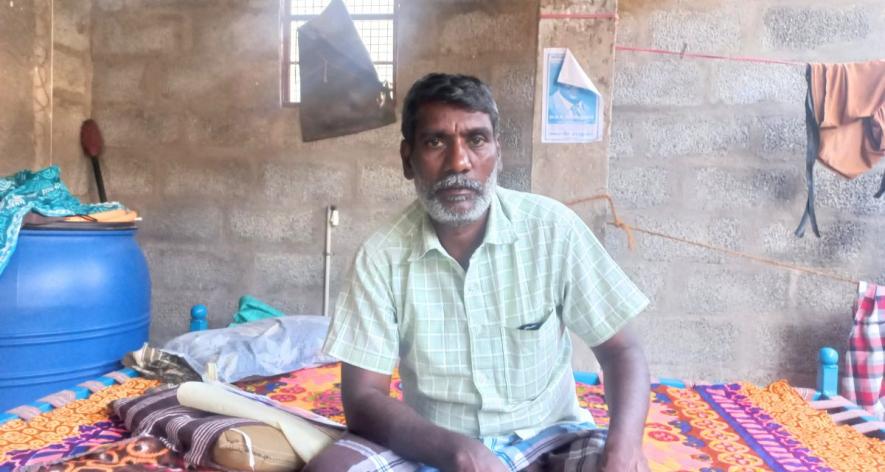
Muruganantham is worried about his life after he took up the issue with the police (Photo - Vignesh A, 101reporters).
Following his complaint on December 6, a case was registered against Sakthivel and Muthu at the Madathukulam Police Station under various sections of Indian Penal Code and the Scheduled Castes and Scheduled Tribes (Prevention of Atrocities) Act.
Muruganantham alleges that the police initially refused to invoke the SC/ST Act, so he had to approach the Tamil Nadu Untouchability Eradication Front (TNUEF). During the course of actions, he informed TNUEF about the caste atrocities meted out to about 50 families in his colony.
TNUEF Tiruppur district secretary CK Kanagaraj informed other Dalit rights organisations, including Dravida Kazhagam and Viduthalai Chiruthaikal Katchi, and arranged for a procession of Dalits wearing footwear towards the Raja Kaliyamman Temple through the Naicker street. A complaint regarding caste discrimination was registered with the Chief Minister’s Special Cell, from where it was forwarded to the district police.
“The authorities initially denied the existence of caste discrimination at Rajavur and asked us to cancel the procession. But we asked them to prove it by allowing Dalits to wear footwear in the Naicker street and enter the temple,” says Kanagaraj.
On December 24, three Dalits from Rajavur, including Muruganantham, took part in the procession backed by TNUEF and other rights organisations.
On January 9, the accused got bail from the Principal District Court, after obtaining a direction from Madras High Court (HC) on December 29 last year. Now, the status quo of not wearing footwear at the caste Hindu’s streets and not entering into the temples has returned.
Terming the act of the Dalits on that day an aberration due to outsiders, a few Naickers told 101Reporters that peace has returned to their village now.
Young, old and the social matrix
“The discrimination is still there for all Dalits, irrespective of their age… Those who work in the lands of the dominant caste members have no option but to follow their rule,” K Arumugam (39), an Arunthathiyar who participated in the procession, tells 101Reporters.
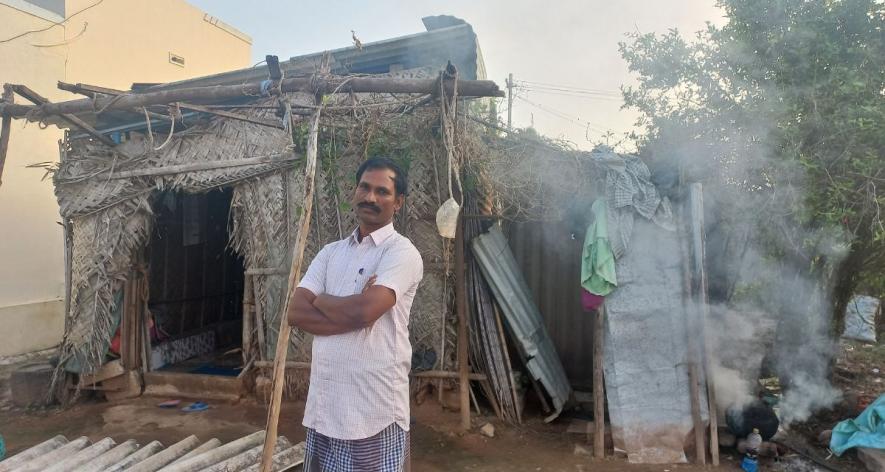
Arumugam is one of the Dalits who visited the Kambala Naicker street with a footwear and later entered into the temple (Photo - Vignesh A, 101Reporters).
However, a reply from J Sukumaran, Deputy Superintendent of Police (DSP), Udumalaipettai, to Kanagaraj on the complaint lodged with the CM's special cell paints a different picture. “The members of the Scheduled Caste did not wear footwear in the aforementioned street and did not enter the temple on their own and the younger generation of the Scheduled Caste do not follow such practices,” the reply states.
Calling attention to the December 27 visit of National Commission for Scheduled Castes (NCSC) Director S Ravivarman to the village, Arumugam adds, “When the NCSC director came, a few women accompanied him to the temple. They did so only to show that there was no discrimination here.”
101Reporters later learnt that those women were estranged relatives of Muruganantham. In fact, a few Dalits had acknowledged the existence of caste discrimination to Ravivarman, who instructed the temple trustee to ensure that the Dalits are allowed inside the temple and to report to the authorities in case they were prevented.
“Like the Naickers’ hereditary rights over Raja Kaliyamman Temple, we have rights over Madurai Veeran Temple. An argument over dining between my husband and a few Naickers prevented the deity’s procession during the 2019 festival. This festival is the only thing that gives us some rights in the village. Afterwards, they did not allow the festival for three years,” a Dalit woman, whose daughter had registered her grievance with the official, tells 101Reporters on condition of anonymity.
She claims her sister was attacked and her husband was forced to prostrate before the aggrieved Naickers after the incident. “We did not have the courage to approach the police then, but my daughter showed it now... She is an engineering graduate who works in Coimbatore... Even some of our own people questioned us for stirring up an old incident in front of a higher official,” she says.
Muruganantham, Arumugam and the Dalit woman allege that the Naickers imposed a ban on Dalit farmhands, but a few families went to the house of the accused on January 4 seeking forgiveness and work. 101Reporters could not independently verify their claim since the Dalit families were averse to talking.
However, two Naickers wishing anonymity claim that they continue to engage Dalits from Rajavur in their farms. They refused to speak about the footwear and temple entry ban, terming them “non-issues created by outsiders”.
Tradition, not discrimination?
“We have not banned the Dalits from wearing footwear or temple entry,” claims a sexagenarian from Rajavur. “It is God’s will. If anybody violates it, something will happen to him/her in 90 days. I do not want to explicitly mention, you understand it by yourself.”
Her husband says the Dalits in their village are amicable towards other communities and “follows the customs”. “Only the outsiders caused trouble,” he adds. The couple neither acknowledged nor denied the existence of caste discrimination, but chose to call it a “custom”.
However, M Mohan Kumar (54), a Kambala Naicker from Periyakottai, puts it differently. “Denial of entry of Dalits is not an issue specific to this temple. It was there everywhere until a few decades ago. But the Dalits from these two villages did not enter voluntarily. We too did not force them, as per the tradition. However, if they want to enter, we will not prevent them,” he says, while denying allegations of black magic by his community.
Standing next to him on the roadside was K Kannamanai, an Arunthathiyar in her 70s. “Even if they allow, our people should not enter as it will invite the deity’s wrath,” she says, in sharp contrast to the aspirations of the younger Dalits.
The future of caste
DSP Sukumaran is the investigating officer in the case filed by Muruganantham, but he speaks the language of the dominant OBC. “Discrimination existed in the village some decades ago, not at present,” he tells 101Reporters, while assuring that legal action will be taken against those who bar Dalits from wearing footwear or entering the temple.
“We opposed the bail, but the accused got an HC direction. Also, the estranged relatives of Muruganantham told the court that this is not a caste issue but a mere civil issue,” he asserts.
“Had the accused been remanded in judicial custody at least for a week, it would have been a morale booster for the Dalits. But when the accused returns to the village instead of going to jail, it sends a bad signal that casteism is unassailable,” Kanagaraj says.
“The ban may not go. Nevertheless, we have shown the Dalits of Rajavur that nobody can suppress them in the name of caste and there are legal avenues to face such discrimination. The caste Hindu’s will not have the audacity to attack or abuse Dalits in the future. Even if they want to, they will have second thoughts,” he adds.
(Vignesh A is a Bihar-based freelance journalist and a member of 101Reporters, a pan-India network of grassroots reporters.)
Get the latest reports & analysis with people's perspective on Protests, movements & deep analytical videos, discussions of the current affairs in your Telegram app. Subscribe to NewsClick's Telegram channel & get Real-Time updates on stories, as they get published on our website.









